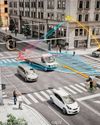Essayer OR - Gratuit
OEMs Explore Options For Optimised Ride And Handling
Auto Tech Review
|June 2017
When we speak of two-wheeler technologies these days, more often than not, discussions are focused around engine development, electronics and suspension. Chassis – that bunch of steel tubes and/or aluminium plates –tends to get ignored. These days, when new bikes are launched, OEMs’ press releases are often filled with details of how engineers extracted every last bit of horsepower from the engine, details of every conceivable electronic rider aid and details of adjustable/active suspension. The chassis? Not so much. And yet, a bike’s chassis,even though it remains hidden under bodywork and lets the engine be the centrepiece in terms of style, remains one of the most important components of a two-wheeler. Chassis design and construction defines the way in which a bike rides and handles, and over the last many decades, OEMs have continued to experiment with various types of construction, all of which have their own positives. Here, we take a look at some of the more recent developments in two-wheeler chassis design.

THE EVOLUTION
Chassis design for powered two-wheelers (motorcycles and scooters) evolved from bicycle chassis about a century ago. Early efforts were pretty basic, with engines being bolted on to beefed-up bicycles frames. Of course, as motorcycle engines became bigger and more powerful, manufacturers felt the need to develop proper chassis that could keep pace with power output. From there, development branched off in various directions, with OEMs experimenting with multiple permutations and combinations of materials, arrangement and construction. The basic purpose remained the same – the chassis would act as the base for mounting a bike’s engine, fuel tank, handlebars and suspension (including the swingarm) – but the ways in which this could get done invited experimentation, which continues to this day.
Over the years, types of two-wheeler chassis used by OEMs includes the steel single or twin downtube cradle-type frame, steel tube perimeter chassis, aluminium twin-spar frame, steel tube trellis frame, hybrid (steel tube trellis section combined with aluminium side plates) frame and aluminium/carbon fibre monocoque chassis. Surprisingly enough, almost every single type of frame mentioned in the list above is still in use today, on modern motorcycles, depending on price, positioning and intended usage. While more basic, commuter-spec two wheelers are often fitted with single or double downtube cradle-type frames, more expensive, higher-end bikes usually get steel tube trellis or aluminium twinspar chassis. Some manufacturers are also using carbon/aluminium monocoques, which do away with steel tubes and/or aluminium spars, thereby reducing weight and complexity.
CHALLENGES IN DESIGN
Cette histoire est tirée de l'édition June 2017 de Auto Tech Review.
Abonnez-vous à Magzter GOLD pour accéder à des milliers d'histoires premium sélectionnées et à plus de 9 000 magazines et journaux.
Déjà abonné ? Se connecter
PLUS D'HISTOIRES DE Auto Tech Review

Auto Tech Review
Sound Generation For Enhanced Road Safety
With an ever-increasing number of fully electric and hybrid vehicles entering the market, we are witnessing a change in the acoustic experience in and around the car. The silent nature of the electric powertrain means that other road users miss the familiar acoustic cues that warn them of an approaching vehicle. To remedy this situation, Harman is working on various noise management solutions.
6 mins
August 2020

Auto Tech Review
OBJECTIVE ASSESSMENT OF THE SAFETY CONTRIBUTION OF TODAY'S AUTOMOTIVE HEADLAMPS
Good lighting makes a major contribution to road safety. In 2011, the International Commission on Illumination (CIE) presented an evaluation system for headlamps that can objectively assess the quality of illumination and glare limitation. New light sources like LEDs and lighting functions (glare-free high beam, partial high beam) have been available for several years, so that an extension of the proven CIE method is necessary, which takes into account, among other things, changed switch-on and service lives of new lighting functions and represents a generally understandable evaluation system. An evaluation system presented in the following by the Technische Uni versität Darmstadt, which was developed by an encompassing expert commission, is intended to provide representative data and enable an objective evaluation of headlamp performance.
8 mins
August 2020

Auto Tech Review
RAPIDO RE-INNOVATES TO CATER TO POST COVID-19 LAST MILE CONNECTIVITY
The rapid pace of urbanisation in the country has witnessed cities expanding and subsuming surrounding villages and smaller towns, evolving into Tier II and III cities.
5 mins
August 2020

Auto Tech Review
FUNCTIONAL SAFETY STANDARDS TOP PRIORITY FOR FUTURE AUTOMOTIVE DEPLOYMENT
Increasing levels of electronic content in vehicles result in a large amount of software that is required to run the scenes behind the mechanical aspects of a vehicle. Electronic systems in automobiles are part of every section, from the powertrain to comfort and convenience systems as well as all types of safety equipment. This makes electronics and the software running these systems a critical part of the equation for future mobility solutions. In addition, putting standards in place to measure methods of developing, testing and functioning of such electronic systems also becomes highly relevant.
5 mins
August 2020

Auto Tech Review
“BYD'S EV STRATEGY TO ENCOMPASS MOST FORMS OF TRANSPORTATION NEEDS IN INDIA”
The country’s electric vehicle (EV) ecosystem is grappling with a plethora of challenges even as it is striving to wriggle itself out of the ‘nascent stage’ tag. In an exclusive chat with Auto Tech Review, Zhang Jie Ketsu, Executive Director, BYD India shares his perspective on the current EV scenario and how the company intends to progress faster in the Indian automotive industry
7 mins
August 2020

Auto Tech Review
SAFETY IN ELECTRIC AND AUTONOMOUS CARS – SIMULATION OF COMPLEX CRASH SCENARIOS
Electric and autonomous vehicles allow for novel seating arrangements and packaging strategies, presenting new safety challenges. Physical crash testing must be supplemented with virtual simulation to ensure vehicle safety on shorter development cycles. With its Simcenter Madymo MBS software, Siemens provides improved runtimes and the Active Human model, enabling accurate and rapid occupant safety analysis in complex crash scenarios.
6 mins
August 2020

Auto Tech Review
KIA SONET – A MIGHTY OFFERING IN THE COMPACT SUV SEGMENT
It wouldn't be wrong to say that Kia Motors India has taken the Indian market by storm in less than 12 months of its presence in the market.
4 mins
August 2020

Auto Tech Review
NISSAN'S NEW DIRECTION: ARIYA ALL-ELECTRIC
Marking a key milestone in Nissan’s transformation strategy, Ariya ticks a lot of boxes highlighting the strengths of the global automotive giant.
5 mins
August 2020

Auto Tech Review
BETTER SAFETY WITH EMERGENCY BRAKE ASSIST FOR MOTORCYCLES
Rear-end collisions with a slower vehicle suddenly cutting into the lane and intersection accidents with cross-traffic are among the most frequent motorcycle accident types. Continental is now developing an emergency brake assist, which detects an imminent collision with a vehicle ahead or with an obstacle, warns the rider and supports him during braking
7 mins
August 2020

Auto Tech Review
ADAS WILL SERVE AS CATALYST FOR IMPROVED VEHICLE SAFETY
The automotive industry across the globe is increasingly focussing on safety.
5 mins
August 2020
Translate
Change font size

